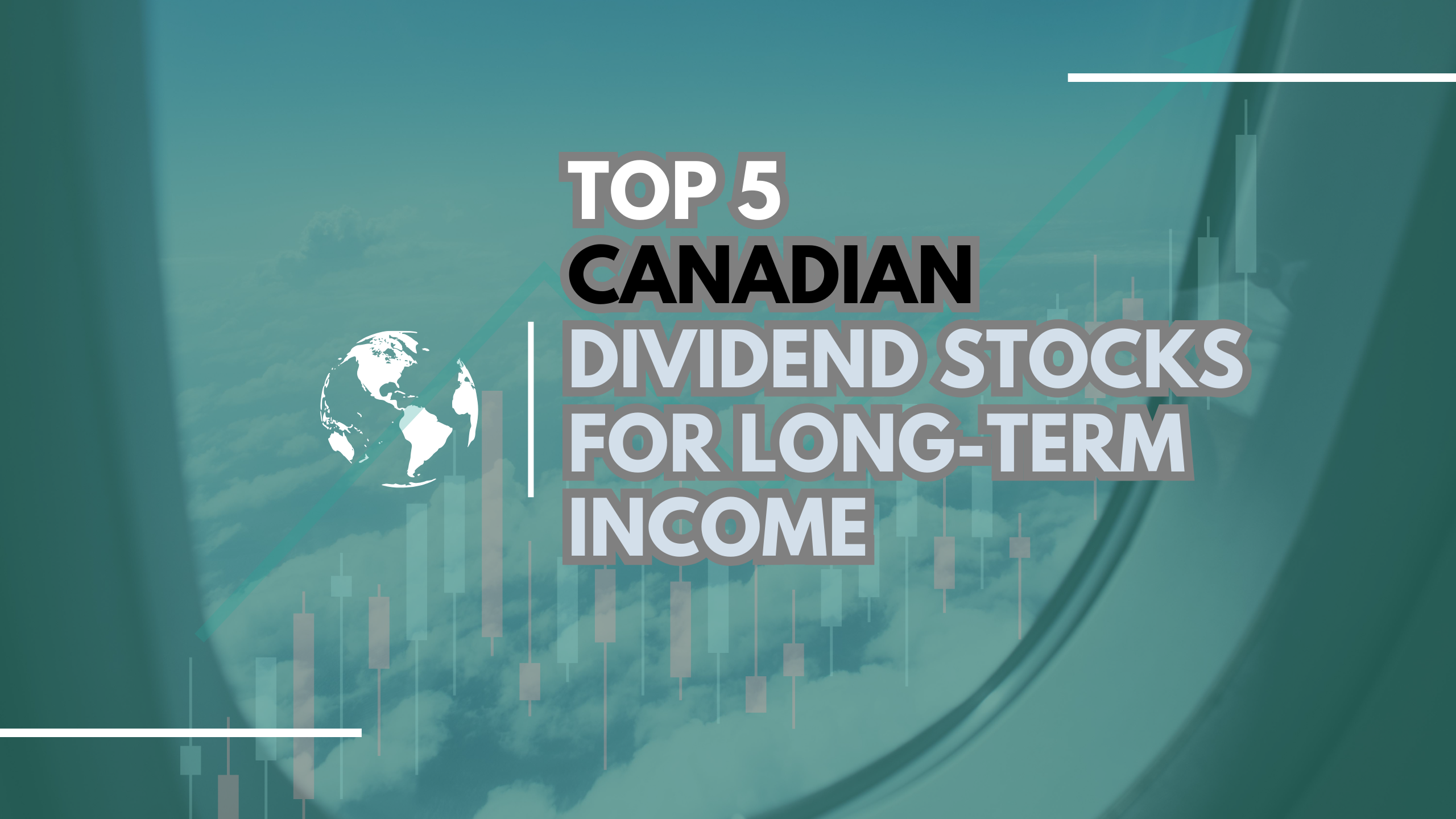
Top 5 Canadian Dividend Stocks for Long-Term Income
Investing in dividend stocks is a solid strategy for building wealth over time, especially for those looking for stable, long-term income. Canadian dividend stocks offer an appealing blend of steady cash flow and potential capital appreciation. With strong financial fundamentals, reliable businesses, and consistent dividend payouts, these stocks can provide both growth and security for income-seeking investors.
In this blog, we’ll explore the top 5 Canadian dividend stocks to consider for long-term income and the reasons behind their inclusion in this list.
1. Royal Bank of Canada (RY.TO)
Sector: Financials
Dividend Yield: 4.5%
Market Cap: $200+ Billion
5-Year Dividend Growth Rate: 6.8%
Royal Bank of Canada (RBC) is the largest bank in Canada by market capitalization and consistently ranks among the top-performing financial institutions globally. Its strong capital position, diverse revenue streams, and ability to generate consistent earnings make it a top pick for long-term investors seeking steady dividend income.
RBC has an established history of increasing its dividend payouts over the years, with a reliable 6.8% dividend growth rate over the past five years. The bank’s strategic initiatives in digital banking and expansion in the U.S. are set to fuel further growth, making it a prime candidate for dividend investors.
2. Enbridge Inc. (ENB.TO)
Sector: Energy
Dividend Yield: 7.6%
Market Cap: $80+ Billion
5-Year Dividend Growth Rate: 8.6%
Enbridge Inc., a giant in the energy infrastructure sector, is best known for operating the largest pipeline network in North America. The company’s reliable cash flow stems from its long-term contracts and regulated assets, making it a safe bet for dividend income seekers.
Enbridge has a stellar track record of 28 consecutive years of dividend increases, and its current yield of 7.6% is one of the highest among Canadian dividend stocks. Its ongoing investments in renewable energy projects also position the company for long-term growth while maintaining a commitment to dividend stability.
3. Fortis Inc. (FTS.TO)
Sector: Utilities
Dividend Yield: 4.1%
Market Cap: $30+ Billion
5-Year Dividend Growth Rate: 5.9%
Fortis Inc. is a leading North American utility company with operations in Canada, the U.S., and the Caribbean. It is known for its low-risk business model, with nearly all of its earnings coming from regulated assets. This stability translates into a dependable dividend, which Fortis has increased for 50 consecutive years.
The company plans to grow its dividend by approximately 4% to 6% annually through 2028, driven by its $25 billion capital investment plan. With its robust dividend history and predictable cash flow, Fortis is a favorite for conservative, long-term income investors.
4. Telus Corporation (T.TO)
Sector: Telecommunications
Dividend Yield: 5.4%
Market Cap: $35+ Billion
5-Year Dividend Growth Rate: 6.7%
Telus is one of Canada’s leading telecom operators, providing a wide range of services, including wireless, internet, and TV. The company has a strong track record of paying dividends, supported by its consistent revenue from an expanding customer base and its investments in 5G infrastructure.
Telus has a dividend growth policy that targets semi-annual increases, aiming for a payout ratio of 60% to 75% of its free cash flow. Given its essential services and growing focus on healthcare technology, Telus remains a solid choice for dividend growth and long-term income.
5. Canadian National Railway (CNR.TO)
Sector: Industrials
Dividend Yield: 2.0%
Market Cap: $100+ Billion
5-Year Dividend Growth Rate: 10.3%
Canadian National Railway (CNR) is the largest railway operator in Canada and plays a crucial role in the North American supply chain. CNR has a long history of generating strong cash flow, which it uses to fund dividend payouts and reinvest in its infrastructure.
While its current yield of 2.0% may seem modest, CNR has an impressive track record of growing its dividend by over 10% annually. As a key player in the North American economy, CNR is well-positioned to deliver long-term capital appreciation and reliable income for investors.
Comparison Table
Here’s a comparison of the top 5 Canadian dividend stocks for long-term income:
| Stock | Sector | Dividend Yield | 5-Year Dividend Growth Rate | Market Cap |
|---|---|---|---|---|
| Royal Bank of Canada (RY) | Financials | 4.5% | 6.8% | $200B+ |
| Enbridge Inc. (ENB) | Energy | 7.6% | 8.6% | $80B+ |
| Fortis Inc. (FTS) | Utilities | 4.1% | 5.9% | $30B+ |
| Telus Corporation (T) | Telecommunications | 5.4% | 6.7% | $35B+ |
| Canadian National Railway (CNR) | Industrials | 2.0% | 10.3% | $100B+ |
Why Invest in Canadian Dividend Stocks?
1. Reliable Income Stream: Canadian companies, especially in the financial, utility, and energy sectors, tend to have stable cash flows that support consistent dividend payouts.
2. Dividend Growth Potential: Many Canadian dividend stocks have strong growth prospects, thanks to their leadership positions in their respective industries. Dividend growth is a key factor that can enhance long-term income for investors.
3. Tax Advantages: Canadian investors benefit from favorable tax treatment on dividends from Canadian companies through the Dividend Tax Credit (DTC). This can make dividend investing a tax-efficient income strategy.
4. Defensive Plays: Sectors such as utilities, telecommunications, and financials are known for their defensive qualities, providing stable returns even during economic downturns.
Conclusion
The top 5 Canadian dividend stocks listed here offer a compelling blend of high yields, dividend growth, and financial stability. For long-term investors looking to build a reliable income stream, stocks like Royal Bank of Canada, Enbridge, Fortis, Telus, and Canadian National Railway provide both current income and future growth potential.
As always, it’s crucial to diversify your investments and conduct your own research or consult with a financial advisor before making any investment decisions.
Disclaimer
The content provided in this blog is for informational purposes only and should not be considered financial advice. Past performance is not indicative of future results, and all investments carry risk. Please consult with a professional financial advisor before making any investment decisions tailored to your personal financial situation.



Leave a Reply